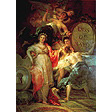
Goya's ideological context







Goya, like the great majority of his contemporaries, had to take side on the solutions that Spain badly needed Alegoría de la Villa de Madrid |
Goya, like the great majority of his contemporaries, was a nationalist in a Spain that impotently watched its progressive loss of political power. The Spaniards of this uncomfortable age were divided as to the diagnosis and possible cure that the country needed.
A powerful faction looked backwards, back to the period of the dynasty of the Austrias; a period of indissoluble union of political and religious power, of military and colonial expansionism, Spanish hegemony in Europe and the exaltation of traditional values at home. The other sector, pro-Enlightenment and reformist, closely followed developments in the societies and cultures of their northern neighbours. What they saw there made them feel justified in attacking the Spanish state. This ideology though partly imported was just as much an inheritance of the Spanish critical tradition of the 16th and 17th centuries. The reformists' stance was a long way from being radical. It only acquired anti-traditionalist, revolutionary shades during the War of Independence. During the conflicts between liberals and absolutists that took up a large part of the 19th century these positions would become more and more radical. The reformist programme looked for ways to redirect the country towards productive activities as a base for raising living standards and Spain's international status. The weapons to be used to this end were education and a questioning attitude towards outdated customs. The next stage would be the reform of the judicial and economic structures, which the reformers were much less inclined to agree about. It should be remembered that the Enlightenment groups included as many members of the aristocracy as they did members of the bourgeoisie, and that their private interests frequently diverged. Francisco Javier García Marco |
 |
InfoGoya 96 is an initiative of the University of Zaragoza, sponsored by the Institution Fernando el Católico of the Deputation of Zaragoza on an Apple Internet Server donated by Apple Computer. |    |